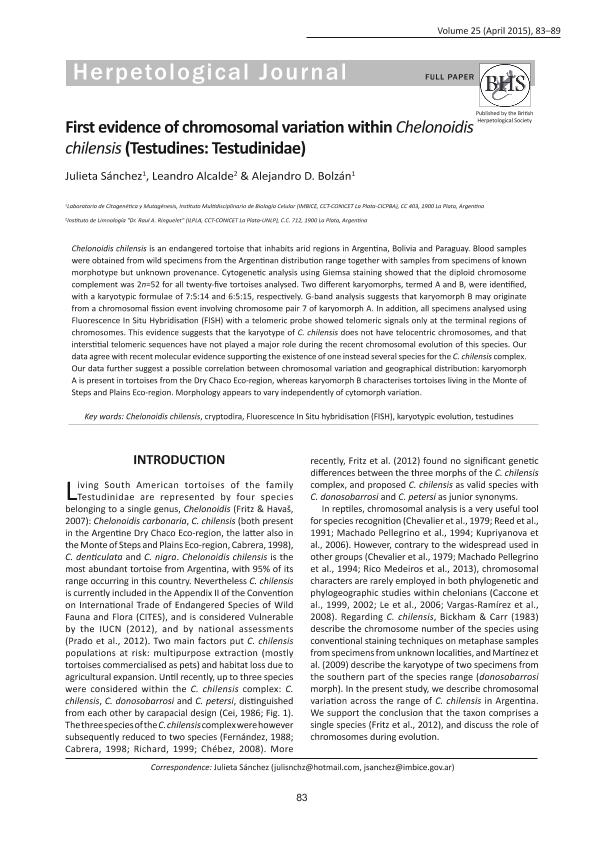Artículo
First evidence of chromosomal variation within Chelonoidis chilensis (Testudines: Testudinidae)
Fecha de publicación:
04/2015
Editorial:
British Herpetological Society
Revista:
Herpetological Journal
ISSN:
0268-0130
Idioma:
Inglés
Tipo de recurso:
Artículo publicado
Clasificación temática:
Resumen
Chelonoidis chilensis is an endangered tortoise species that inhabits arid regions from Argentina, Bolivia and Paraguay. Blood samples were obtained from wild specimens from the whole range of the distribution of the species in Argentina togheteher with samples from specimens of known morphotype but unknown procedence. Cytogenetic analysis using Giemsa staining showed that the diploid chromosome complement of all tortoises analyzed (n=25) was 2n = 52. Two different karyomorphs, termed A and B, were also identified, with a karyotypic formulae of 7:5:14 and 6:5:15, respectively. G-band analysis suggests that karyomorph B may be originated from a chromosomal fission event involving chromosome pair 7 of karyomorph A. In addition, all specimens analyzed using fluorescence in situ hybridization (FISH) with a telomeric probe showed telomeric signals only at the terminal regions of chromosomes. This evidence suggests that the karyotype of C. chilensis does not have telo¬centric chro¬mosomes, and that interstitial telomeric sequences have not played a major role during chromosomal evolution of this species. Our data agree with recent molecular evidence supporting the existence of only one species for the Chelonoidis chilensis complex, instead of two or three ones, as previously suggested by other authors. Finally, present data may suggest a possible correlation between chromosomal variation and geographical distribution of the wild tortoises studied, since karyomorph A is present in tortoises from the Dry Chaco Eco-region, whereas karyomorph B characterizes tortoises living in the Monte of Steps and Plains Eco-region, independently of the morphotype the tortoises have.
Palabras clave:
Testudines
,
Cryptodira
,
Chelonoidis Chilensis
,
Karyotypic Evolution
Archivos asociados
Licencia
Identificadores
Colecciones
Articulos(ILPLA)
Articulos de INST.DE LIMNOLOGIA "DR. RAUL A. RINGUELET"
Articulos de INST.DE LIMNOLOGIA "DR. RAUL A. RINGUELET"
Citación
Sánchez, Julieta; Alcalde, Leandro; Bolzan, Alejandro Daniel; First evidence of chromosomal variation within Chelonoidis chilensis (Testudines: Testudinidae); British Herpetological Society; Herpetological Journal; 25; 2; 4-2015; 83-89
Compartir




